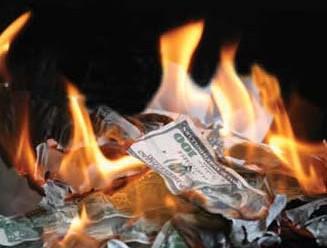
Up in smoke. Photo credit: Purpleslog
While London burns to the ground, hundreds of thousands die in Somalia’s famines, and the Sun appears ready to rain telecomm-destroying electromagnetic evil from the sky, there’s another disaster waiting to happen: Financial Armageddon. And this time, it’s going to be really bad.
Markets slumped on Tuesday, on fears that the US and Europe will be unable to deal with their respective debt burdens and that more credit downgrades are on their way; as of Monday, Reuters reported, stock losses worldwide erased about $3.8 trillion in investor wealth. Meanwhile, anyone looking to Asia for comfort was disappointed: China’s higher-than-expected inflation and slower industrial output “puts the country’s central bank in a bind as it tries to keep prices in check without dragging down an economy that already faces increasing threats from abroad”. That, Reuters said, means that China might not be in the same position as it was after the 2008 financial collapse, able to lift the global economy out of the doldrums on its own tremendous growth.
How did we get here? The Wall Street Journal’s The Source blog explains.
All this while the leader of the world’s largest economy, the US, mumbles about balance in cutting American debt: Several commentators have blasted President Barack Obama for his post-Standard & Poor’s downgrade speech, noting that if he wanted to calm the markets, he didn’t really succeed.
So where does this leave us? And why?
- This is not like 2008. Some commentators have seen the 2011 financial crisis as simply a redux of the 2008 Lehman Brothers-caused crisis: “Just substitute Friday’s historic downgrade of the U.S. credit rating by Standard & Poor’s for the collapse of the investment bank in September 2008, et voilà, you have a carbon copy of an event that made the unthinkable happen and spooked markets around the globe,” explained Francesco Guerrera, editor of the Wall Street Journal’s investing section. But, he said, looking at this crisis through a 2008 prism is a recipe for trouble – there are three fundamental differences between now and then. First, the causes are clearly different: In 2008, the problem came from the bottom; now, it comes from the top, because governments have lost control of their economies. Secondly, this time around, “The economic doldrums are prompting companies and individuals to stash their cash away and steer clear of debt, resulting in anemic consumption and investment growth.” And that leads to the third problem, which is that this time around, governments can’t bail themselves out.
- This shows how great the Coalition is. Deputy Prime Minister Nick Clegg, writing in The Times (£), suggested that the solution to the roiling global economy is political, declaring, “it has never been clearer that good economics and good politics go hand in hand.” This whole thing just shows, he said, that the Coalition did the right thing with its austerity measures and deficit reduction efforts: “[T]he UK was taken off the “negative outlook” list of the credit rating agencies. Market confidence has been restored. The Bank of England has been able to keep interest rates low, a godsend for hard-pressed homeowners. And the cost of servicing our debt has been dramatically cut.” Huzzah! “Good politics — coalition politics — has provided the country with strong economic leadership, just when it was needed most.”

